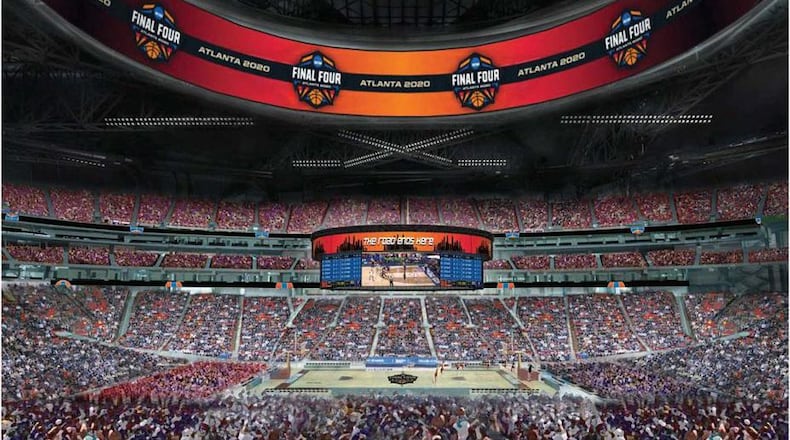It's an amazing decision, but we're living in an extraordinary moment. COVID-19 is moving so quickly that none of us knows how things will look today, tomorrow, next week. By midnight April 6, we might have reason to believe the worst is behind us, as seems the case in China. But what if it's not? What if the NCAA threw open the gates to sporting palaces from sea to shining sea and, one month hence, we can point the finger at March Madness for having made everything worse?
We don't know that's what would have happened. Again, that's the point. At a time when the national health is imperiled in a way it hasn't been for more than 100 years, is there any risk worth taking? It was only a week ago that this correspondent dared to ask if the NCAA tournament might be played be behind closed doors. With every day since, it became clearer that the once-unthinkable was drawing nearer to becoming the inevitable.
Think about New York. Its governor ordered a lockdown Tuesday of New Rochelle, a Big Apple suburb. And yet, the Atlantic 10 was about to open its conference tournament in Brooklyn and the Big East was to play in the heart of Manhattan. How, in the grand scheme, do you square that? As I write, I’m in a hotel next to Bridgestone Arena, site of the SEC tournament. Meanwhile, a school district 20 minutes south of here has closed for health concerns.
Ohio governor Mike DeWine – he’s a Republican, if you care to play politics; I do not – essentially forced the NCAA to decide. The tournament’s First Four is set, as ever, for Dayton next Tuesday and Wednesday. A subregional will be played in Cleveland. DeWine had advised Tuesday that there be no large gatherings in his large state until the COVID all-clear is sounded. The NHL’s Columbus Blue Jackets said they would defy that. On Wednesday, DeWine’s advisory became an order.
The NCAA had a choice: Do we uproot the Ohio games – and surely the ones set for Spokane and Sacramento and Madison Square Garden – and try to move them somewhere safe? But then came the next question: Where in this nation – where in this world – is safe?
And there we’re back to, “We don’t know.” And then the course became clear. There’s no guarantee that playing the tournament without fans won’t lead to positive tests for players/coaches/media – there will still be travel involved – but it will be travel on a smaller scale. There will be no packed house at the Greensboro Coliseum, no 80,000 on hand in Mercedes-Benz Stadium for Semifinal Saturday. The masses will have to watch on TV. Someday those masses might even thank Mark Emmert.
Said Emmert: “The NCAA continues to assess the impact of COVID-19 in consultation with public health officials and our COVID-19 advisory panel. Based on their advice and my discussions with the NCAA Board of Governors, I have made the decision to conduct our upcoming championship events, including the Division I men's and women's basketball tournaments, with only essential staff and limited family attendance.”
I’m no big fan of Emmert’s, but I can’t fault his choice. As Bill Hancock, now the College Football Playoff’s executive director and formerly the man charged with running the Final Four for the NCAA, told us last week: “The reality is that sports is not the highest priority.”
Sports, see, are supposed to divert us from real life. But how diverting can they be if you’re paying money for game tickets and all the while you’re worrying whether the ticket-taker washed his/her hands? How much fun can you have if you’re fearful your hotel might become a containment zone? Yes, this is unprecedented stuff – there was no Final Four during the Spanish Flu of 1918 – and that’s all the more reason the body that stages the Final Four had to do as it did. When in doubt, it had to err on the side of public health.
As an Atlantan, I’m disappointed. This Final Four was supposed to be our shining moment. Still, it’s far better to deal with momentary disappointment than to be etched in history as the city where hundreds of thousands of folks came to watch basketball and wound up getting sick. It will be fascinating to see if other sports – MLB, MLS, the NBA, the Masters – do the same. As we speak, it’s hard to imagine they wouldn’t. You’d hate to be the institution that scoffed at coronavirus and had to spend the rest of your corporate begging forgiveness.
The NCAA tournament is among the more massive entities on the sporting calendar, and its president just said, “We can’t take that chance.” This was nobody’s idea of a best-case scenario, but this is a moment where no best cases exist. There’s damage control, triage and quarantine. There’s a virus that has changed our world in ways we wouldn’t have believed, but here we are. The NCAA has done the only thing it could have done. Let’s hope it helps. Let’s pray something helps.
Editor’s note: Concerns about the coronavirus have resulted in the cancellation of many events and large gatherings. The AJC will monitor these announcements and keep you informed about any postponements, rescheduling and cancellations, but it’s best to check with venues or event organizers before making plans to attend.
About the Author
The Latest
Featured





